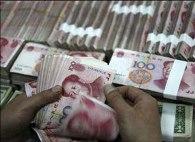 The Chinese yuan has the potential to be an alternative to the US dollar and help create a multi-currency global reserve system, says an Asian Development Bank report.
The Chinese yuan has the potential to be an alternative to the US dollar and help create a multi-currency global reserve system, says an Asian Development Bank report.
A joint report by the ADB and the Columbia University's Earth Institute released on Thursday says the global crisis is likely to accelerate the yuan/renminbi policy liberalisation.
"The internationalisation of the renminbi has the potential to become an alternative to the US dollar-as did the euro-and help nudge the global reserve system toward a multi-currency reserve structure," the report notes.
The yuan is in focus internationally, following last week's announcement by the Chinese central bank that it will move towards a more flexible currency. The decision came in the face of increasing international pressure, especially from the US, to reform the yuan. Since then, the focus has been on the yuan, which has climbed higher in the spot market.
The ADB-financed study by 17 monetary experts, including the Noble laureate Joseph Stiglitz, asserts that a globalised yuan may play very important global and regional roles, provided that China successfully improves its monetary policy mechanisms.
As per the report, simulations show that once the yuan becomes more convertible, it can gradually grow to become an international currency -- "sharing from about 3-12 per cent of international reserves by 2035".
In the wake of the global financial meltdown, and dramatic rise of other currencies against the US dollar, questions have been raised about the sustainability of the US unit as a global reserve currency, with some experts even calling for the replacement of the greenback.
Interestingly, a recent study by the Reserve Bank of India mooted the idea of floating the rupee as a global currency. According to the ADB report, re-balancing in the global economy can result in a need for a wider range of currencies to settle trade and investment in the future.
"With Asia's growing economic clout, the region should increase economic integration and policy coordination to smooth the transition to a multi-currency reserve system," the ADB study emphasises. Stiglitz points out in the report that the dollar-based reserve system has been fraying for years.
"A new global reserve system is absolutely essential if we are to restore the global economy to sustained prosperity and stability. But achieving this is not easy," he added.







